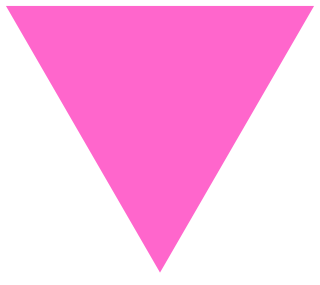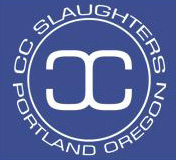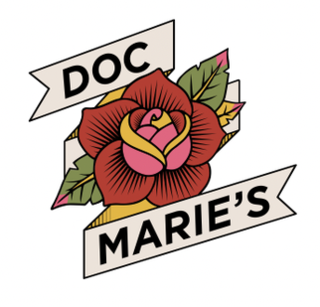Related Research Articles

A pink triangle has been a symbol for the LGBT community, initially intended as a badge of shame, but later reclaimed as a positive symbol of self-identity. In Nazi Germany in the 1930s and 1940s, it began as one of the Nazi concentration camp badges, distinguishing those imprisoned because they had been identified by authorities as gay men. In the 1970s, it was revived as a symbol of protest against homophobia, and has since been adopted by the larger LGBT community as a popular symbol of LGBT pride and the LGBT movements and queer liberation movements.

The Burnside Triangle, also known as Pink Triangle or Vaseline Alley, was a triangular district in Portland, Oregon, United States, known for its relatively higher density of LGBT and gay-friendly businesses.

Pride Northwest, Inc. is a community-based regional LGBTQ+ Pride 501(c)(3) nonprofit organization based in Portland, Oregon, United States. The non-profit organization was founded in 1994 and the current executive director of the organization is Debra Porta, who has served as the president of Pride Northwest since 2006.
Historically, the portrayal of lesbian, gay, bisexual, and transgender (LGBT) people in media has been largely negative if not altogether absent, reflecting a general cultural intolerance of LGBT individuals; however, from the 1990s to present day, there has been an increase in the positive depictions of LGBT people, issues, and concerns within mainstream media in North America. The LGBT communities have taken an increasingly proactive stand in defining their own culture, with a primary goal of achieving an affirmative visibility in mainstream media. The positive portrayal or increased presence of the LGBT communities in media has served to increase acceptance and support for LGBT communities, establish LGBT communities as a norm, and provide information on the topic.

CC Slaughters is a gay bar and nightclub located in Portland, Oregon, and Puerto Vallarta, Mexico. The Portland bar is located in the Old Town Chinatown neighborhood, and the Puerto Vallarta bar is located in Zona Romántica.

LGBT culture in Eugene, Oregon predates the Stonewall riots in New York in 1969, but that event coincided with organized efforts in Lane County, Oregon, to support and celebrate LGBT people. Even though Eugene has been rated on lists of cities friendly to LGBT populations, there are very few venues specifically for the LGBT community in the Eugene/Springfield metropolitan area.

LGBT culture in Portland, Oregon is an important part of Pacific Northwest culture.

.gay is a top-level domain name. It was proposed in ICANN's New generic top-level domain (gTLD) Program, and became available to the general public in September 2020. Top Level Design is the domain name registry for the string.

Stag PDX, or simply Stag, is a gay-owned nightclub and strip club in Portland, Oregon's Pearl District, in the United States. The club opened in May 2015 as the second all-nude gay strip club on the West Coast.
Lynn R. Nakamoto is an American judge who is a former justice of the Oregon Supreme Court. She was appointed to the court by Governor Kate Brown, and previously served on the Oregon Court of Appeals from 2011 to 2016.
Rupert Kinnard also credited as Prof. I.B. Gittendowne, is an American cartoonist who created the first ongoing gay/lesbian-identified African-American comic-strip characters: the Brown Bomber and Diva Touché Flambé. Kinnard is gay and African American.

The Dirty Duck building, or Dirty Duck Tavern building, was located at the intersection of Northwest Third Avenue and Glisan Street in Portland, Oregon's Old Town Chinatown neighborhood, in the United States. Originally called the Kiernan Building, the one-story structure earned its nickname from Gail's Dirty Duck Tavern, a gay bar that served as a tenant for 25 years.

"Blow Pony" is a popular queer event based in Portland, Oregon.
Queer erasure refers to the tendency to intentionally or unintentionally remove LGBT groups or people from record, or downplay their significance, which includes lesbian, gay, bisexual, transgender, and queer people. This erasure can be found in a number of written and oral texts, including popular and scholarly texts.
Belinda Carroll is an American standup comedian, writer, activist, actress, and singer. She is the founder of the Portland Queer Comedy Festival, organizer of the Portland Dyke March, and is a co-organizer as well as date auction host and fundraiser emcee of the Butch Voices Portland Regional Conference.
This article features the history of the representation of lesbian, gay, bisexual, and transgender (LGBT) characters in animated productions under The Walt Disney Company, including films from the studios Walt Disney Animation Studios and Pixar, and programming from the Disney Branded Television channels as well as the streaming service Disney+. From 1983 onward, Disney struggled with LGBTQ representation in their animated series, and their content often included LGBT stereotypes or the content was censored in series such as Blazing Dragons. Some creators have also criticized Disney studio executives of cutting LGBTQ scenes from their shows in the past, or criticized that their shows were not seen as part of the "Disney brand", like The Owl House.

Doc Marie's is an LGBT-friendly bar in Portland, Oregon.
References
- ↑ "Gay and Lesbian Archives of the Pacific Northwest | Portland State University Studies: Senior Capstone". capstone.unst.pdx.edu. Retrieved 2017-07-08.
- ↑ "GLAPN Archives - Your #ProudQueer News Source CA+OR+WA". Your #ProudQueer News Source CA+OR+WA. Archived from the original on March 25, 2015. Retrieved 2017-07-08.
{{cite web}}: CS1 maint: unfit URL (link) - ↑ "Gay and Lesbian Archives of the Pacific Northwest". socialarchive.iath.virginia.edu. Retrieved 2017-07-08.
- ↑ Ridinger, Robert. "LibGuides: LGBT Studies Research Sources: Libraries and Archival Collections". libguides.niu.edu. Retrieved 2017-07-08.
- ↑ "GLAPN Archives - Your #ProudQueer News Source CA+OR+WA". Your #ProudQueer News Source CA+OR+WA. Archived from the original on March 25, 2015. Retrieved 2017-07-08.
{{cite web}}: CS1 maint: unfit URL (link) - ↑ "GLAPN Oral History Archive". www.glapn.org. Retrieved 2017-07-08.
- ↑ "How a Classified Ad in an Underground Newspaper Ignited Portland's LGBTQ Rights Movement". Willamette Week. Retrieved 2020-09-19.
- ↑ Lynn, Logan. "Made in Oregon: Homophobia!". Portland Mercury. Retrieved 2017-07-08.
- ↑ Prager, Sarah (2015-09-25). "LGBT History Walking Tours for Every City". Huffington Post. Retrieved 2017-07-08.
- ↑ "GLAPN Celebrates Black History Month with Q Center Exhibit". Your #ProudQueer News Source CA+OR+WA. Archived from the original on May 2, 2017. Retrieved 2017-07-08.
{{cite news}}: CS1 maint: unfit URL (link)